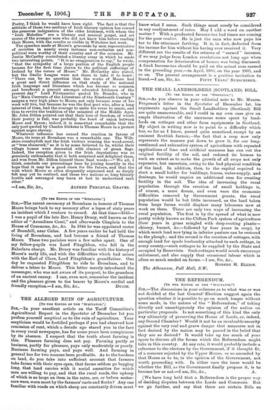THE SMALL LANDHOLDERS (SCOTLAND) BILL.
[To THE EDITOR OF THE 'SPECTATOR."1 Sr,—As you observe in your editorial note to Mr. Munro. Ferguson's letter in the Spectator of December 1st, his arguments against the Small Landholders (Scotland) Bill are quite unanswerable, and I could in my own case give an ample illustration of the enormous sums spent by land- lords on cottages and other farm equipments in Scotland. My object in writing now is to point to a difficulty which has, so far as I know, passed quite unnoticed, except by an eminent Scottish farmer,—the fact that a crop now only represents the manure put down to grow it, for our long- continued and exhaustive system of agriculture with repeated applications of lime and artificial manures has run out the original fertility of the soil, and reduced its humus to such an extent as to make the growth of all crops not only expensive, but uncertain, owing to the bad physical condition of the land. In addition, then, to the capital required to start a small holder for buildings, fences, water-supply, and drainage, he would require an additional sum for creating fertility in the soil. The idea of increasing the rural population through the creation of small holdings is, of course, a mere dream, and even were the economic difficulties removed by Government grants, the rural population would be but little increased, as the land taken from large farms would displace many labourers now at work on them. There are only two ways of increasing the rural population. The first is by the spread of what is now pretty widely known as the Clifton Park system of agriculture (four years in grass mingled with deep-rooting plants— chicory, burnet, 8c.e.—followed by four years in crop), by which much land now lying in inferior pasture can be restored to the plough ; and the second is the creation of cottages, with enough land for spade husbandry attached to each cottage, in every county,—such cottages to be supplied by the State and occupied by Reservists. Such cottages would much encourage enlistment, and also supply that occasional labour which is often so much needed on farms.—I am, Sir, &c.,


























































 Previous page
Previous page